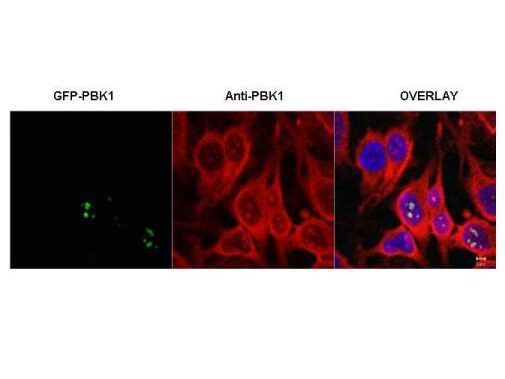Anti-PBK1 (RABBIT) Antibody
PBK1 Antibody
- SPECIFICATION
- CITATIONS
- PROTOCOLS
- BACKGROUND

| Host | Rabbit |
|---|---|
| Conjugate | Unconjugated |
| Target Species | Human |
| Reactivity | Human |
| Clonality | Polyclonal |
Application
| WB, E, IP, I, LCI |
| Application Note | This affinity purified antibody has been tested for use in ELISA, immunoprecipitation, immunofluorescence microscopy and western blotting. Specific conditions for reactivity should be optimized by the end user. Expect a band approximately 55 kDa in size corresponding to PBK1 by western blotting in the appropriate cell lysate or extract. This antibody is capable of detecting both over-expressed and endogenous PBK1. For immunofluorescence microscopy, fix cells with methanol. |
| Physical State | Liquid (sterile filtered) |
| Buffer | 0.02 M Potassium Phosphate, 0.15 M Sodium Chloride, pH 7.2 |
| Immunogen | This affinity purified antibody was prepared from whole rabbit serum produced by repeated immunizations with a synthetic peptide corresponding to an internal sequence of human PBK1. |
| Preservative | 0.01% (w/v) Sodium Azide |
| Gene ID | 26156 |
|---|---|
| Other Names | 26156 |
| Purity | This product was affinity purified from monospecific antiserum by immunoaffinity chromatography. This antibody is specific for human PBK1 protein. A BLAST analysis was used to suggest limited cross-reactivity with PBK1 from mouse based on a 75% homology with the immunizing sequence. Cross-reactivity with PBK1 from other sources has not been determined. |
| Storage Condition | Store vial at -20° C prior to opening. Aliquot contents and freeze at -20° C or below for extended storage. Avoid cycles of freezing and thawing. Centrifuge product if not completely clear after standing at room temperature. This product is stable for several weeks at 4° C as an undiluted liquid. Dilute only prior to immediate use. |
| Precautions Note | This product is for research use only and is not intended for therapeutic or diagnostic applications. |
| Name | RSL1D1 |
|---|---|
| Synonyms | CATX11, CSIG {ECO:0000303|PubMed:1867864 |
| Function | Regulates cellular senescence through inhibition of PTEN translation. Acts as a pro-apoptotic regulator in response to DNA damage. |
| Cellular Location | Nucleus, nucleolus. Note=Colocalizes with ING1 in the nucleolus after UV stress. |
| Tissue Location | Expressed at high intensities in the heart, skeletal muscle, and placenta. |

Thousands of laboratories across the world have published research that depended on the performance of antibodies from Abcepta to advance their research. Check out links to articles that cite our products in major peer-reviewed journals, organized by research category.
info@abcepta.com, and receive a free "I Love Antibodies" mug.
Provided below are standard protocols that you may find useful for product applications.
Background
This antibody is designed, produced, and validated as part of a collaboration between Rockland and the National Cancer Institute (NCI). PBK1 protein (also known as Ribosomal L1 domain-containing protein 1, cellular senescence-inhibited gene protein, and CATX-11) was isolated from highly invasive first trimester trophoblast cells and has been proposed to regulate their naturally occurring invasive behavior (Huch et al., 1998). PBK1 was also found to be over-expressed in non-small-cell lung cancer (NSCLC) cells (Petroziello et al., 2004). A recent study suggests that PBK1 may up-regulate the urokinase-type plasminogen activator (uPA) gene, which plays an important role in cellular matrix degradation and activation of other protease systems involved in cell invasion (Tong et al., 2005). The cellular localization dynamics of PBK1, as well as the data from its yeast homologue (Cic1p/Nsa3p) suggest that PBK1 is essential for ribosome biogenesis (Fatica et al., 2003). Thus, PBK1 could be controlling cell proliferation by regulating the level of ribosome production. It is hypothesized that PBK1 is involved in regulating both, cell proliferation and invasiveness, therefore playing a dual function in cancer cells transformation.
If you have used an Abcepta product and would like to share how it has performed, please click on the "Submit Review" button and provide the requested information. Our staff will examine and post your review and contact you if needed.
If you have any additional inquiries please email technical services at tech@abcepta.com.













 Foundational characteristics of cancer include proliferation, angiogenesis, migration, evasion of apoptosis, and cellular immortality. Find key markers for these cellular processes and antibodies to detect them.
Foundational characteristics of cancer include proliferation, angiogenesis, migration, evasion of apoptosis, and cellular immortality. Find key markers for these cellular processes and antibodies to detect them. The SUMOplot™ Analysis Program predicts and scores sumoylation sites in your protein. SUMOylation is a post-translational modification involved in various cellular processes, such as nuclear-cytosolic transport, transcriptional regulation, apoptosis, protein stability, response to stress, and progression through the cell cycle.
The SUMOplot™ Analysis Program predicts and scores sumoylation sites in your protein. SUMOylation is a post-translational modification involved in various cellular processes, such as nuclear-cytosolic transport, transcriptional regulation, apoptosis, protein stability, response to stress, and progression through the cell cycle. The Autophagy Receptor Motif Plotter predicts and scores autophagy receptor binding sites in your protein. Identifying proteins connected to this pathway is critical to understanding the role of autophagy in physiological as well as pathological processes such as development, differentiation, neurodegenerative diseases, stress, infection, and cancer.
The Autophagy Receptor Motif Plotter predicts and scores autophagy receptor binding sites in your protein. Identifying proteins connected to this pathway is critical to understanding the role of autophagy in physiological as well as pathological processes such as development, differentiation, neurodegenerative diseases, stress, infection, and cancer.


